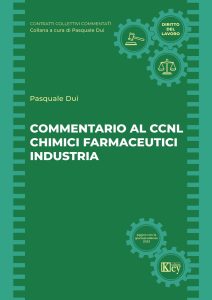
Atty Matteo Motroni contributes to the Commentary to the NCBA for Pharmaceuticals Industry
Our Salary Partner Matteo Motroni underlines what the form is expected to be for employment contracts in chemical and pharmaceutical industries. Specifically, the conditions and essential elements to be included for the work contract to be validly executed. He points out the contents that must be present in the letter of employment and the information obligations incumbent on the employer, as well as the information that can be legitimately acquired by the employer at pre-employment stage, to which the issue of the ‘criminal record certificate’ is precisely related.
Regarding the probationary period, Mr Motroni’s focus is on its form, content and cause. He also explains how the probationary period may be extended and what happens in the event of employee’s failure to pass the trial succesfully. Finallly, he reminds about term and duration of the probationary agreement in fixed-term contracts.
Furthermore, Matteo addresses the topics of professional apprenticeship contracts, temporary contracts, labour lease, and part-time employment relationships.
The National Collective Agreement in scope
 The NCBA (in Italian, CCNL) of 13 June 2022 for workers in the chemical, chemical-pharmaceutical, chemical fibres and abrasive, lubricants and LPG industries, between Federchimica Farmindustria and Filctem-Cgil Femca-Cisl Uiltec-Uil Ugl-Chimici Failc-Confail Fialc-Cisa is divided into 17 chapters and is updated and coordinated for the Chemical and Pharmaceutical Chemical (Industry) sector to be valid for the period 1 January 2016 – 30 June 2025.
The NCBA (in Italian, CCNL) of 13 June 2022 for workers in the chemical, chemical-pharmaceutical, chemical fibres and abrasive, lubricants and LPG industries, between Federchimica Farmindustria and Filctem-Cgil Femca-Cisl Uiltec-Uil Ugl-Chimici Failc-Confail Fialc-Cisa is divided into 17 chapters and is updated and coordinated for the Chemical and Pharmaceutical Chemical (Industry) sector to be valid for the period 1 January 2016 – 30 June 2025.
The preamble to the contract states how the chemical-pharmaceutical industry, which is strategic in the post-pandemic period, wishes to confirm that it is a modern, participatory and effective industrial relations system, characterised by a sense of responsibility, mutual credibility and proactivity in the search for negotiating solutions that are useful for the sector and consistent with the shared guidelines.

